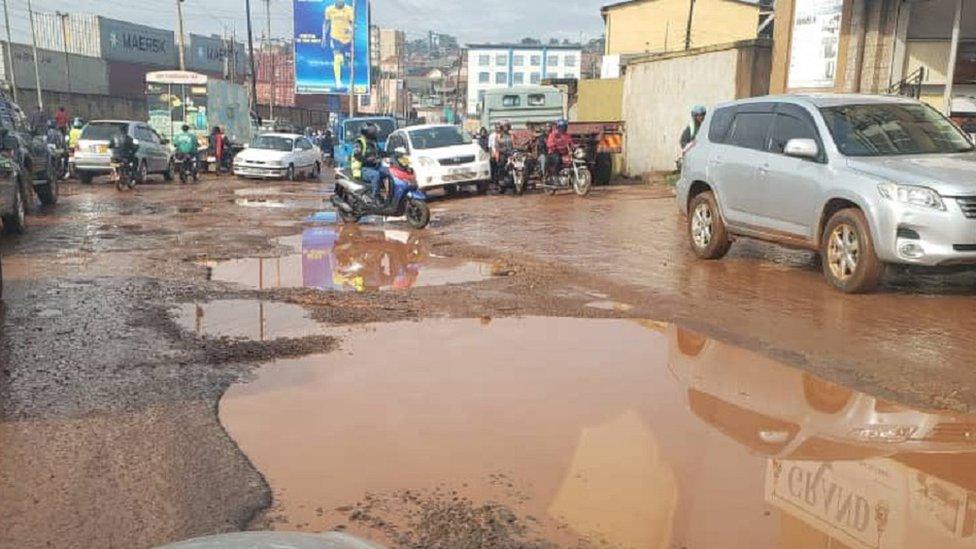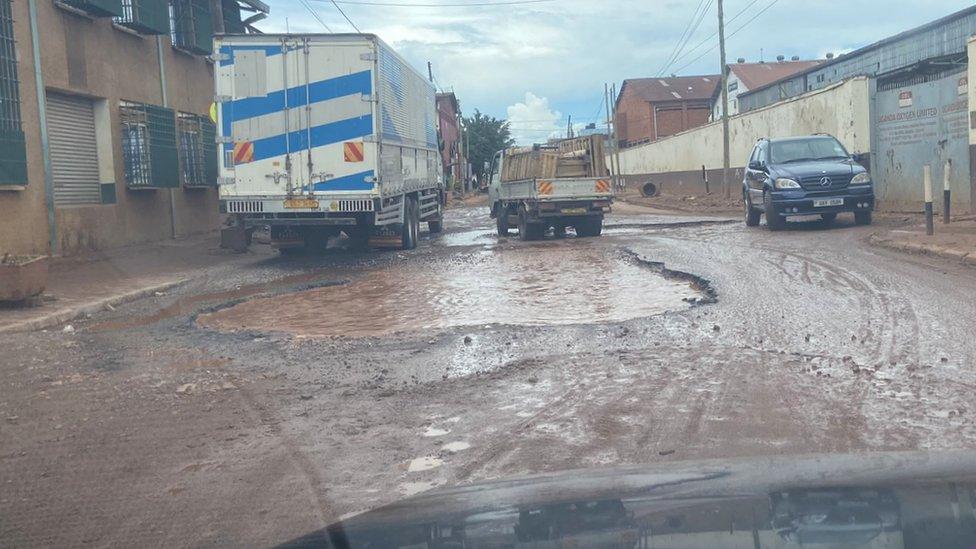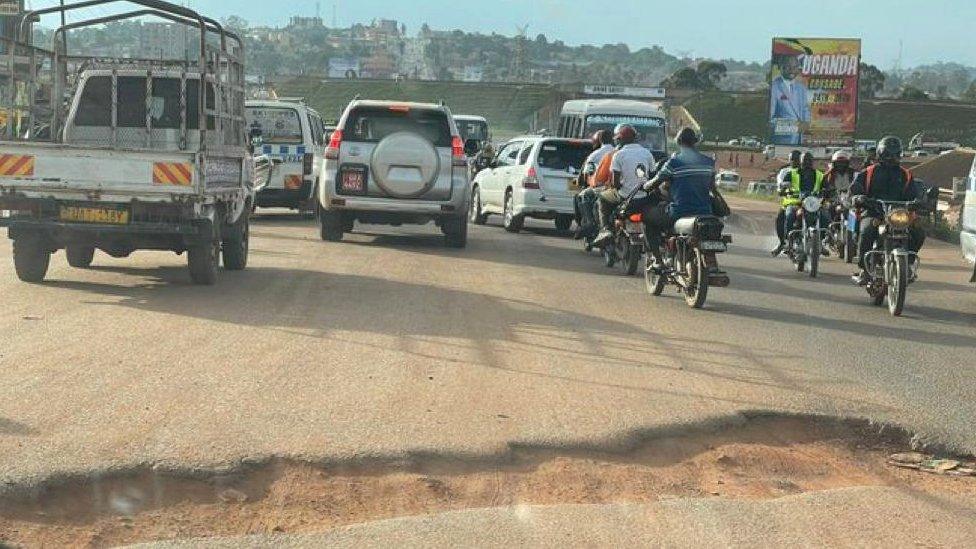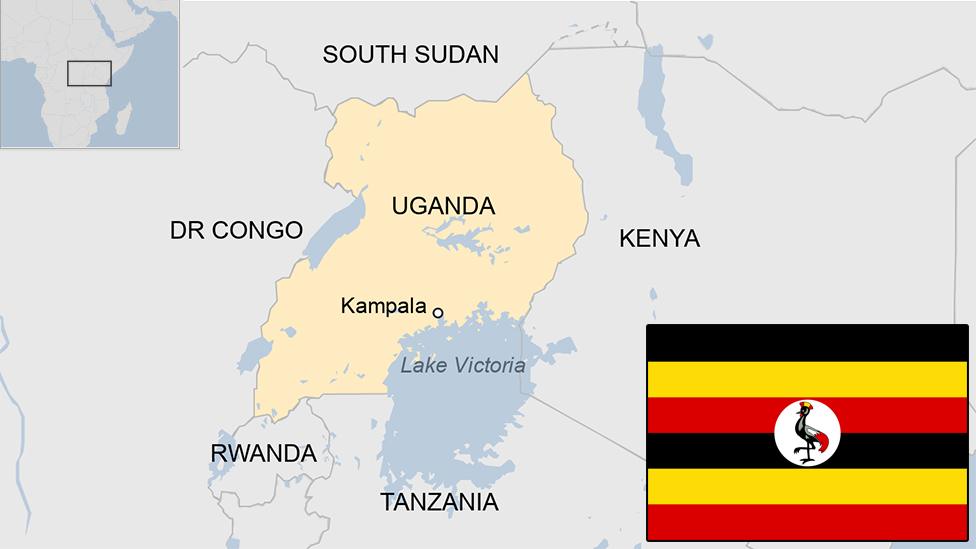Ugandans rage over roads: 'Not a pothole but a pond'
- Published

The potholes form an obstacle course for drivers on some roads
The huge craters that pockmark many of the roads in Uganda's capital have become the subject of a Twitter trend.
Using #KampalaPotholeExhibition, external, residents have been sharing images of the city's many potholes that their vehicles have to gingerly make their way around or through.
The local authority has acknowledged the problem, saying the cavities amount to 8,500 sq m (91,493 sq ft) in area.
But it added that it did not have the funds to fill them all.
When academic, writer and cartoonist Dr Jimmy Spire Ssentongo started the campaign, even he could never have imagined the kind of material that would turn up.
"That is not a pothole! That is a pond!" he responded to one person who shared a photo.
Some have turned the photos into memes with graphics added - like ships sailing across potholes or people chilling on the beach, complete with palm trees, next to other ones.

Some residents feel like the potholes have become permanent geographical features
The florid descriptions accompanying the images - including details such as a pothole's age - might be satirical, but they also point to how long a particular road has been in bad shape.
Some potholes feel like they have become permanent geographical features, creating a series of mini lakes whenever it rains.
A few weeks ago, when I tweeted that in one part of town there were potholes within potholes, one follower responded that the ones on the road he regularly uses had become stairs.
"We have potholes of every design, and size, deep, shallow, wide, narrow, filled with water and dry ones, they are all in Kampala," the deputy speaker of parliament, Thomas Tayebwa, has been quoted as saying when calling for a minister to explain the situation.
The Kampala Capital City Authority (KCCA), charged with the city's road maintenance, will from time-to-time fill the crevices up with a clay-like soil called murram.
But piles of soil cannot withstand the heavy rainy season and the murram gets washed away, as can be seen in some of the tweets.
Allow X content?
This article contains content provided by X. We ask for your permission before anything is loaded, as they may be using cookies and other technologies. You may want to read X’s cookie policy, external and privacy policy, external before accepting. To view this content choose ‘accept and continue’.

Dr Ssentongo says his campaign is intended to shame those who are failing to maintain the roads, "to make them uncomfortable at their own incompetence".
"If they have any sense of shame they should act," he said, pointing to the dangers of potholes and the fact that city residents paid tax for roads to be maintained.
In response, the KCCA tweeted that the issue could not be trivialised and it was aware of the damage they caused to cars.
It said the roads were "due for overhaul... which explains the high prevalence of potholes and other road damages".
"The situation has not been helped by the increased traffic levels on the roads, which in turn causes increased wear and tear," it added.
Dr Ssentongo's online "exhibition" is meant to last for a week and the academic is considering running a weekly pothole award in the future.
With the authorities being less than tolerant of protests on the streets, many feel this is an innovative way for Dr Ssentongo to address the issue - and no-one has been arrested yet for photographing a pothole.

Drivers have been snapping images of potholes as they sit in traffic
Some online critics have said that the exhibition might affect tourism by keeping potential visitors away from the country.
But analyst Ivan Rugambwa disagrees: "The #KampalaPotholeExhibition is not a malicious campaign by unpatriotic citizens looking to tarnish their country's image.
"It is a patriotic act of citizen agency to draw attention to the sorry state of their capital so that those charged with the responsibility to fit it can do so," he tweeted.
In June 2010, some city residents took to "fishing" along one road in one district of the city, in their own attempt to draw the city authorities' attention to the potholes in the area.
- Published26 April 2023
